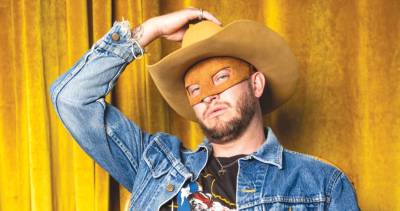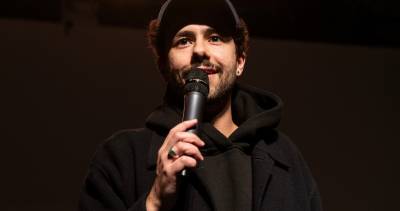Premier John Horgan and cabinet minister Bruce Ralston highlight Holodomor in English, French, and Ukrainian
Between 1932 and 1933, Joseph Stalin’s totalitarian Soviet regime inflicted mass starvation and genocide on the people of Ukraine
It's not unusual to see B.C. government statements in languages other than English.
Messages are routinely transmitted in simplified and traditional Chinese script, Punjabi, and French—a language that Health Minister Adrian Dix commonly speaks in COVID-19 briefings to the media.
But it's not nearly as often that messages are transmitted in Ukrainian, which is one of the national variations of the Cyrillic script. The Ukrainian written language has 33 letters, including 20 consonants.
However, because today marks Ukrainian Famine and Genocide (Holodomor) Memorial Day—the province has translated a statement by Premier John Horgan and Energy, Mines and Low Carbon Innovation Minister Bruce Ralston into Ukrainian.
You can read the statement below in English:
“On the fourth Saturday in November, we join Ukrainian communities around the world in remembering the victims of Holodomor and honouring the strength of survivors.
“Between 1932 and 1933, Joseph Stalin’s totalitarian Soviet regime inflicted mass starvation and genocide on the people of Ukraine. Known to history as the Holodomor, or 'killing by starvation', between three million and four million Ukrainian children, women and men died. Lands were stolen and crops grown by the people were seized.
“The Soviet Union’s systematic and mass starvation of the Ukrainian people was a heinous attempt to quell the nation’s culture and dream of independence. Almost 60 years later, that dream of independence was realized.
“Two years ago, Ukrainian Famine and Genocide (Holodomor) Memorial Day was officially designated as a day of remembrance in British Columbia. On this solemn day, we come together to remember the victims and recognize the injustice of their suffering. This can never be allowed to happen again.
“Our government will continue to stand up for equality and justice, as we build a better province and a better world.”
The Ukrainian translation is available here. It's also available in French.
In the 2016 census, there were 229,205 British Columbians of Ukrainian ethnic origin, accounting for 5.03 percent of the provincial population.
For many years at this time of year, Ralston has been acknowledging the Holodomor. He even introduced private member's bills in 2009 and 2013 to have this commemorated officially in B.C.
Below, you can see a photo of him at a gathering of community members in 2019.
https://twitter.com/bruceralston/status/1114324494871490561?ref_src=twsr...
In 2019, B.C. Green Leader Andrew Weaver introduced another private member's bill to enshrine Holodomor Memorial Day in B.C.
It was supported by Ralston and members of the NDP and Liberal caucuses. Ukrainian Famine and Genocide (Holodomor) Memorial Day Act received royal assent on October 29, 2019.
In introducing the bill, Weaver shared a compelling and horrific story about how his great-grandfather and great-grandmother and five of their nine children were taken from their home in Ukraine in winter and dumped in the Vodogda region of northern Russia.
"Women and children were separated from able-bodied men and herded into a church," Weaver related in a speech in the legislature. "Conditions were appalling. There was one loaf of bread for 18 people."
Children began dying en masse, according to Weaver, until those under the age of 15 were allowed to be sent to their relatives and friends.
His grandfather, Alexander Krawchenko, and his great-grandmother managed to escape, dressing like Russians and travelling almost 1,500 kilometres back to Ukraine. They begged for food along the way.
Weaver's great-grandfather escaped separately and also made it back to Ukraine, where he died in 1951.
Krawchenko immigrated to Montreal in 1950 with $5 in his pocket and four family members in France waiting to join him.
"Within half a year or so, being a good welder...he had saved up enough money to pay for the transatlantic passage that brought everyone, including my mother, to Montreal," Weaver said.
Ralston told the legislature in 2019 that he actually has no Ukrainian ancestry, but became very aware of the Holodomor after being elected as the MLA for Surrey-Whalley in 2005. This constituency is home to the Ukrainian Orthodox Cultural Centre, which is next to the Ukrainian Orthodox Church of St. Mary.
"What I discovered was something that I didn’t really know anything about—the history of Holodomor and its significance to Canadians who trace their origins to Ukraine," Ralston said in the legislature. "I particularly want to thank Katherine and Bill Miske, who really got me interested. They really piqued my interest in this topic."
Ralston explained that the word Holodomor comes from two Ukrainian words: holod, meaning hunger, starvation, or famine; and moryty, to induce suffering, to kill.
"During this time, the Soviet state had drawn a line around a huge area in Ukraine and would not let anyone come or go from that area," Ralston said. "And inside that area that was circumscribed, they set very high—impossibly high—quotas of grain for villages to contribute and forbade Ukrainians from leaving their village in search of food. The inevitable consequence, along with a battery of laws to enforce that, was the resulting tragedy and widespread famine that killed many, many people."
To read the entire discussion in the legislature in 2019, go here.















Comments